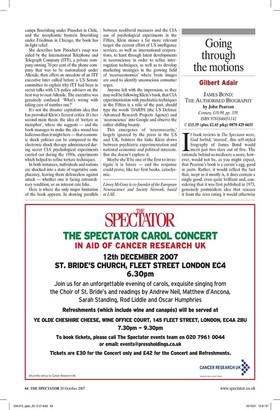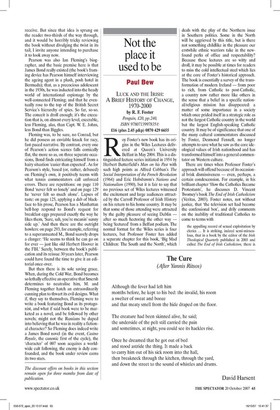Going through the motions
Gilbert Adair JAMES BOND: THE AUTHORISED BIOGRAPHY by John Pearson Century, £18.99, pp. 339, ISBN 9781846051142 £15.19 (plus £2.45 p&p) 0870 429 6655 1 f book reviews in The Spectator were, God forbid, 'starred', this self-styled biography of James Bond would merit just two stars out of five. The rationale behind so mediocre a score, however, would not be, as you might expect, that Pearson's book is a curate's egg, good in parts. Rather, it would reflect the fact that, inept as it mostly is, it does contain a single good, even quite brilliant and, considering that it was first published in 1973, genuinely postmodern idea that rescues it from the zero rating it would otherwise receive. But since that idea is sprung on the reader two-thirds of the way through, and it would be horribly tricky reviewing the book without divulging the twist in its tail, I invite anyone intending to purchase it to look away now.
Pearson was also Ian Fleming's biographer, and the basic premise here is that James Bond really existed (the book's framing device has Pearson himself interviewing the ageing agent in a plush, posh hotel in Bermuda); that, as a precocious adolescent in the 1930s, he was inducted into the heady world of international espionage by the well-connected Fleming; and that he eventually rose to the top of the British Secret Service's hierarchy of spies. So far, so-so. The conceit is droll enough; it's the execution that is, on almost every level, execrable, less Fleming, alas, than Capt. W. E. Johns, less Bond than Biggles.
Fleming was, to be sure, no Conrad, but he did possess an enviable knack for racy, fast-paced narrative. By contrast, every one of Pearson's action scenes falls comically flat, the more so as, on three separate occasions, Bond finds extricating himself from a hairy situation 'easier than expected'. As for Pearson's style, based (or, rather, debased) on Fleming's own, it positively teems with what tennis commentators call unforced errors. There are repetitions: on page 110 Bond 'never felt so lonely' and on page 129 he 'never felt so much alone'. Lapses of taste: on page 125, applying a dab of blackface to his prose, Pearson has a Manhattan bell-hop respond to Bond's request for breakfast eggs prepared exactly the way he likes them, 'Sure, sah, you're meanin' sunny side up.' And then there are the outright howlers: on page 293, for example, referring to a superannuated M., Bond suavely drops a danger: 'He seems to think he can go on for ever — just like old Herbert Hoover in the FBI.' Surely, between the book's publication and its reissue 30 years later, Pearson could have found the time to give it an editorial once-over.
But then there is its sole saving grace. When, during the Cold War, Bond becomes so lethally effective an operative that Smersh determines to neutralise him, M. and Fleming together hatch an extraordinarily cunning plan to thwart its evil designs. What if, they say to themselves, Fleming were to write a book featuring Bond as its protagonist, and what if said book were to be marketed as a novel, and be followed by other novels; might not the Russians be duped into believing that he was in reality a fictional character? So Fleming does indeed write a James Bond novel (in the event, Casino Royale, the canonic first of the cycle), the 'character' of 007 soon acquires a worldwide cult following, the enemy is duly confounded, and the book under review earns its two stars.
The discount offers on books in this section remain open for three months from date of publication.








































































 Previous page
Previous page